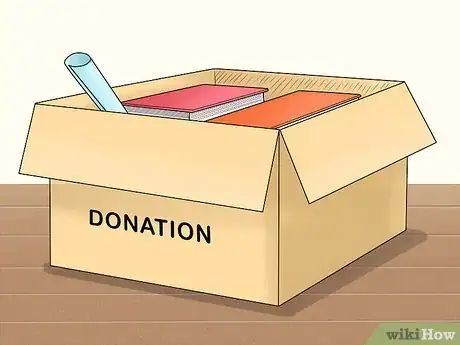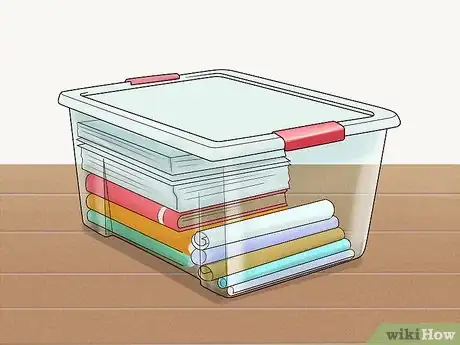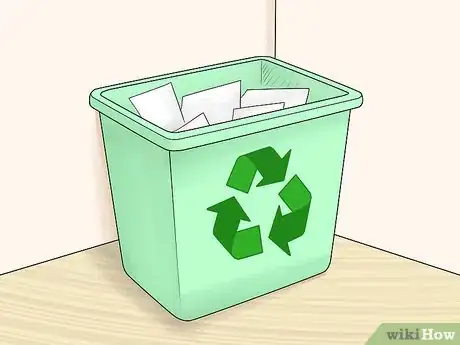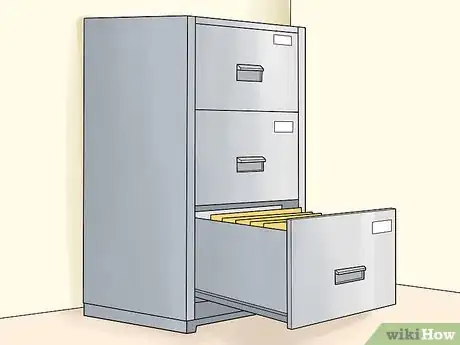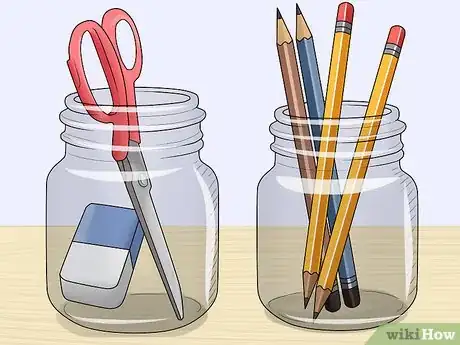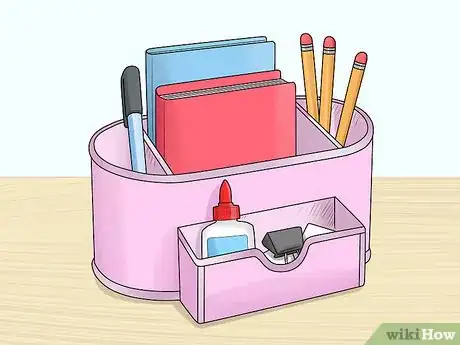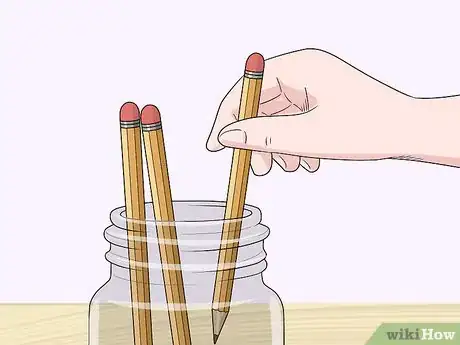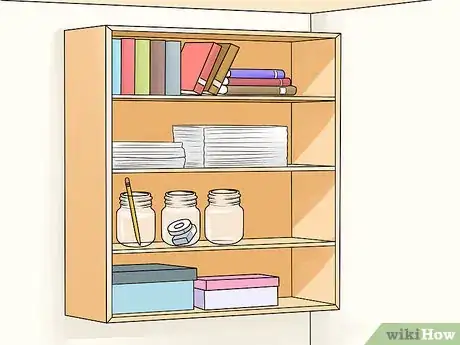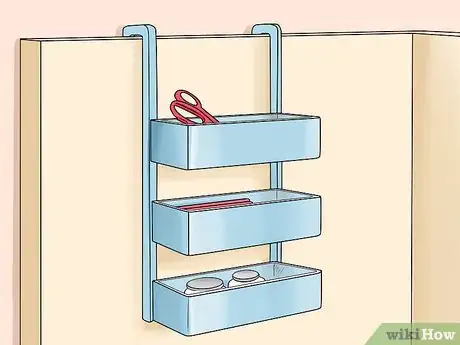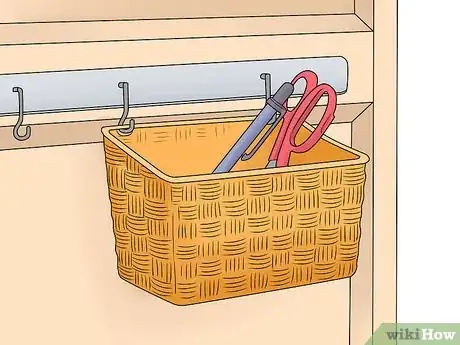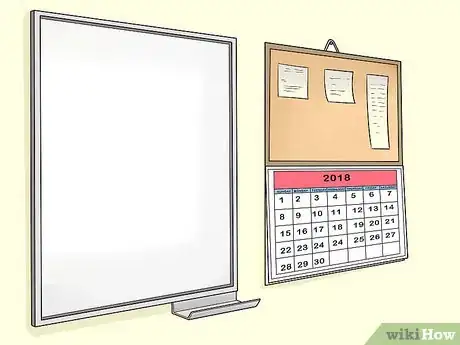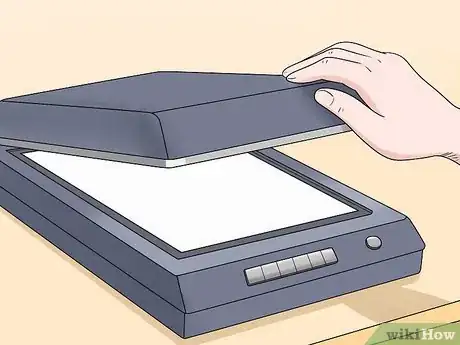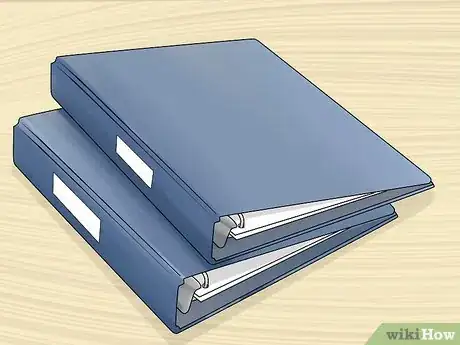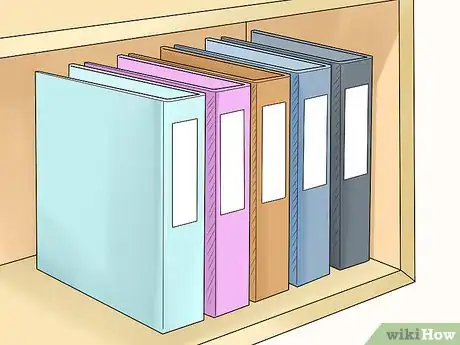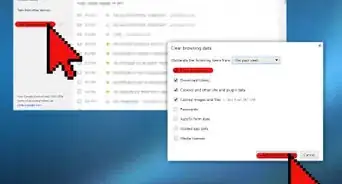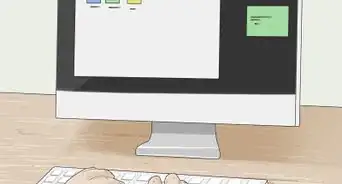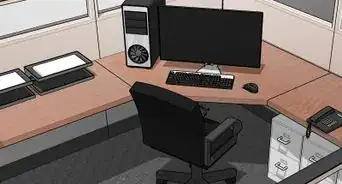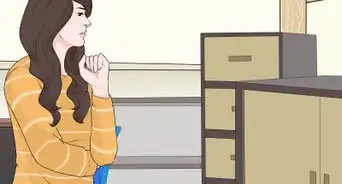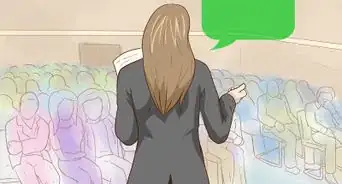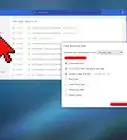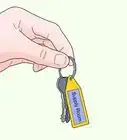This article was co-authored by Keith Bartolomei. Keith Bartolomei is a Professional Organizer who runs his own consulting business called Zen Habitat based in the San Francisco Bay Area. Keith is a member of the National Association of Productivity and Organizing Professionals (NAPO), and is a Certified KonMari Consultant. He has over six years of organizational experience and has been trained in the art of tidying, including being trained by author of The Life Changing Magic of Tidying Up, Marie Kondo, and her team. He has been voted as one of the Best Home Organizers in San Francisco by Expertise in 2018 and 2019.
This article has been viewed 20,986 times.
You don’t need a desk to keep all your office supplies organized! Just get rid of unnecessary things, be creative with what space you have, and sort through the paperwork you probably have stacked up. Then you'll be able to find what you need exactly when you need it, no matter what you’re working on.
Steps
Reducing Clutter
-
1Donate items you don’t need. You might be surprised at how many office supplies you have! Sort everything into piles, separating out what you want to keep and what you can get rid of. Take extra pads of paper or pencils to your local thrift store or veteran organization. [1] Goodwill, St. Vincent de Paul, and other nonprofit organizations generally accept unused or lightly used office supplies. [2]
- Be sure to check each location’s website for a list of what they are looking for. You can also call if the website doesn’t offer information on specific donations.
- Alternatively, take office supplies in good condition to a nearby school. Teachers and students would welcome the additional items.
- Larger equipment like computers, printers, and scanners can also be donated to thrift stores. They’re useful tools that can be sold at a low price.
-
2Store supplies you don’t use often. You don’t need uncommon supplies sitting out for everyone to see, so find a way to store these things.
- A plastic bin stored in the basement or under the bed, easily accessible but out of the way, would be perfect.
Advertisement -
3Recycle unneeded papers/paperwork. Look through all those bits of paper hanging around. Purge used scratch paper, out-of-date notes, and whatever else you don’t need any more.
- Be sure to shred documents containing sensitive information before recycling.
Making the Most of Organization Tools
-
1Fill a filing cabinet. These are traditionally used for paper files, but that’s so boring! A filing cabinet can hold your notebooks or other flat items, or anything else you have lying around.
- Take a tabletop desk organizer and place it into a cabinet drawer to hide all your supplies away.
- Metal sides can be used to hang notecards or papers or those fun pencil holders meant for the inside of school lockers.
-
2Use glass jars to hold small supplies. Designate each one for a certain supply and then store all on a shelf. Feel free to decorate them with labels, paint, or ribbon.
- Flip the jars on their sides and attach them to the wall or a sturdy piece of furniture for creative cubbies!
- Make a magnetic strip and keep them on the bottom of shelves.
-
3Keep items in a supply caddy. If you don’t have that many office supplies, put them in a supply caddy and keep it stored away when not in use. Retrieve the caddy when working on a project, and then return it when you’re finished. Simple as that!
-
4Put things back where they belong. When things don’t have a home, it’s easy for mess to return. You don’t have to go crazy with this or put tape outlines on shelves, but knowing generally where an item should go when you’re finished with it will keep things organized for longer.[3]
Utilizing Wall Space
-
1
-
2Use hanging organization systems. If you’re renting a space or just don’t want holes in your wall, look for lighter all-in-one filing systems that can hang from or lean against the wall. They come in many different styles can fit into most budgets.
- Tall units offer smart storage for papers, documents, printer paper, and notepads. These lie flat against the wall and have slots that look like mail sorters.
- Some have many compartments, which can replace a traditional desk organizer. With something like this you can effectively store all those little items that would usually sit out on a desk.
- An over-the-door hanger would also be a great option.
-
3Hang things from hooks. The simple metal hooks most people use by the front door can also be used in your workspace. Hang a basket for all your pens, or loft an organization kit typically meant for a flat surface. There is literally no limit to what you can dangle, so get creative.
-
4Put up calendars and whiteboards. No need to waste surface space with those tear-off day calendars. Having a calendar fosters an organized environment, and magnetic whiteboards are nice because you can use hang notes and other papers.
Archiving Important Paperwork
-
1Make digital copes of documents. Paper can get damaged or lost, so it’s a good idea to save everything digitally. Keep all your files without the bulk! You can do this yourself with a scanner, or you can send your papers to an outside company. [5]
- Computers are not infallible, so have a plan if yours were to crash. External hard-drives can store masses of information, and some computers have programs to back up your computer.
-
2Use binders to store paperwork. Buy appropriately sized binders for the amount of paper you want to store, then sort by topic.
- Medical Binder: Keep together your family’s insurance information, medical and dental records, and allergy information.
- Auto Binder: This can be for automotive repair records, maintenance history, and insurance information.
- Home Binder: This encompasses maintenance receipts, pest control, security system, and contact information for handymen or landscapers.
- Pet Binder: Don’t forget your pet! Vaccination records, adoption papers, and pedigree information, should all be kept in one place.
-
3Store binders in a safe, dry location. Store them on a shelf or in a filing cabinet. With proper labeling, you will be able to retrieve information easily and quickly.
Expert Q&A
Did you know you can get expert answers for this article?
Unlock expert answers by supporting wikiHow
-
QuestionHow do I organize my office supplies?
 Keith BartolomeiKeith Bartolomei is a Professional Organizer who runs his own consulting business called Zen Habitat based in the San Francisco Bay Area. Keith is a member of the National Association of Productivity and Organizing Professionals (NAPO), and is a Certified KonMari Consultant. He has over six years of organizational experience and has been trained in the art of tidying, including being trained by author of The Life Changing Magic of Tidying Up, Marie Kondo, and her team. He has been voted as one of the Best Home Organizers in San Francisco by Expertise in 2018 and 2019.
Keith BartolomeiKeith Bartolomei is a Professional Organizer who runs his own consulting business called Zen Habitat based in the San Francisco Bay Area. Keith is a member of the National Association of Productivity and Organizing Professionals (NAPO), and is a Certified KonMari Consultant. He has over six years of organizational experience and has been trained in the art of tidying, including being trained by author of The Life Changing Magic of Tidying Up, Marie Kondo, and her team. He has been voted as one of the Best Home Organizers in San Francisco by Expertise in 2018 and 2019.
Professional Organizer & Certified KonMari Consultant
References
- ↑ https://pickupplease.org
- ↑ https://www.thebalancecareers.com/where-donate-office-equipment-3515023
- ↑ https://psychcentral.com/blog/9-lesser-known-tips-for-getting-staying-organized/
- ↑ https://www.sunset.com/home/decorating/office-organization#office-inspiration-board
- ↑ http://www.oprah.com/home/peter-walshs-ten-steps-to-home-office-organization/all
- ↑ https://www.inc.com/neil-patel/how-to-organize-your-office-for-maximum-productivity.html
